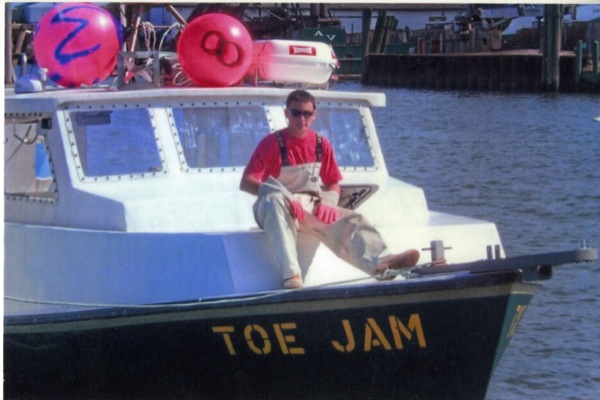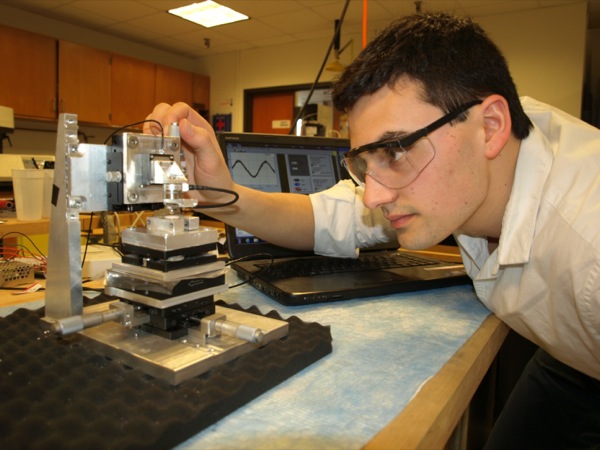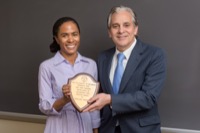


Taste for adventure
UD's 36th Laird fellow charts course for adventure as biomedical engineer
1:52 p.m., April 22, 2013--The son of a commercial fisherman, Axel C. Moore is no stranger to adventure.
He was fishing on commercial vessels at the age of 10 and operating a 42-foot long lobster boat alongside his father by his teens. By his early 20s, Moore had spent nearly 200 days at sea as an engineman, visiting ports in Europe, India and the war-torn country of Sri Lanka, as well as other countries.
Honors Stories
National Medal of Science
Warren Award
These experiences provided many life-lessons, among them to be adventurous, seek knowledge and strive for excellence in everything.
Today, Moore is a doctoral student studying biomedical engineering at University of Delaware. He was recently chosen to receive the 2013 Laird Fellowship.
First awarded in 1977 to honor the memory of George W. Laird, a mechanical engineering graduate of UD who died in an accident at the age of 35, the prestigious fellowship is awarded to candidates who exhibit character, creativity, imagination and perseverance. The award encourages recipients to engage in “broadening intellectual pursuits” that may or may not directly apply to the student’s chosen field.
Oddly enough, it was Moore’s undergraduate study of marine engineering and time on the water that inspired him to shift gears and study biomedical engineering. The inspiration grew not only out of discussions about the novel impact engineers can have in the medical field, but from a first-hand experience with mechanical failure.
“I first appreciated the mechanics behind the lubrication process when I saw a ship lose a 900 kW diesel generator due to oil contamination,” he explained. The oil, contaminated via a fuel leak, caused metal-on-metal contact within the generator, which sparked a fire and melted the bearings, effectively destroying the device.
After witnessing the immense damage that resulted from a failure in proper lubrication, Moore became fascinated with the subject. His investigation eventually led to human joint lubrication and the function of articular cartilage.
“Looking back, it’s silly that I didn’t make the connection earlier that human joints are analogous to any mechanical joint,” he said.
At UD, Moore’s research centers on studying cartilage mechanics and their relationship to osteoarthritis (OA), a condition that affects over 45 million Americans. Advised by David Burris, assistant professor of mechanical engineering and biomedical engineering, he calls every day at UD “an adventure.”
“My research has proven to me that it is not surprising that cartilage fails, what is surprising is that it ever worked in the first place,” said Moore, who also recently earned a 2013 Force and Motion Foundation scholarship. The grant will enable him to further research aimed at demonstrating that local defects of a certain size in the body can initiate OA through mechanical mechanisms that are well-understood for engineering materials.
“Despite clinical evidence that mechanical factors are strongly tied to OA risk, there have been no direct studies of potential mechanical contributors,” he explained. “I hope to demonstrate whether OA has a purely biomechanical pathway, clarify the nature of the responsible mechanism and provide a working understanding necessary for the design of controlled studies of OA progression and treatment.”
Moore credits several people with mentoring his personal journey, among them Burris, who “has given me the passion for research” and his father, who “taught me values, character, hard work” and “to rise to the challenge.”
Already paying it forward, Moore is a graduate research assistant in Burris’ tribology lab, where he regularly directs and assists undergraduate researchers in joint projects. He is also a volunteer educator for UD’s K-12 Engineering outreach program, an activity that he said distinguished him with the Laird selection committee.
“The committee told me on more than one occasion that it was not just my research or grades that qualified me, but my letters of recommendation, similarity to George W. Laird and excitement in teaching,” he said.
Like all Laird fellows, Moore’s interests are wide-ranging. The avid fisherman, traveler and marine engineer is passionate about surfing, snowboarding, fixing cars and boats, and playing paintball. An EPA-certified universal technician and U.S. Coast Guard certified assistant engineer, he also enjoys cooking and wood and metal working.
Moore, who is from Millsboro, Del., earned a bachelor’s of marine engineering technology (summa cum laude) at the California Maritime Academy in 2012, where he earned the distinction of cadet chief engineer. He is the first biomedical engineering student at UD to become a Laird fellow.
Article by Karen B. Roberts









